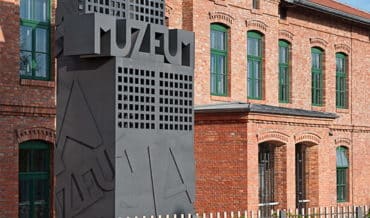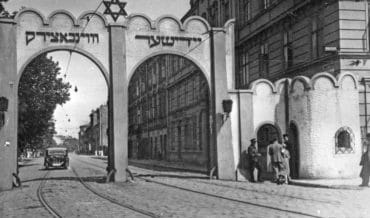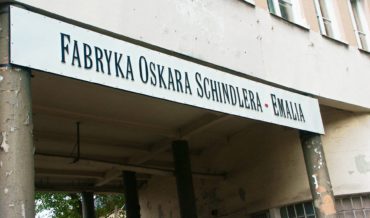Contents
Key Facts
- Born in 1908 in Krakow, died in 1988 in the same city
- Renowned hematologist and professor at Medical Academy in Krakow
- Participated in September Campaign 1939 and Polish resistance during WWII
- Led the hospital in Krakow Ghetto (1942-1944) under extreme conditions
- Resistance codename: "Doktor Twardy" (Doctor Tough)
- Pioneer in ecological diagnosis and prevention of lymphocytic leukemia and multiple sclerosis
- Awarded the Silver Cross of the Virtuti Militari and other prestigious military honors
- Has a street named after him in Krakow (ul. Juliana Aleksandrowicza)
Early Life and Education
Julian Aleksandrowicz was born in 1908 in Krakow, where he would spend his entire life contributing to both medicine and his city's history. His educational journey at the prestigious Jagiellonian University was notably interdisciplinary. He initially pursued studies at the Faculty of Medicine, demonstrating early academic excellence, but also expanded his knowledge by studying at the Faculty of Physical Education, reflecting his holistic approach to health and human well-being.
This dual educational background would later influence his pioneering work in ecological medicine, as he understood the interconnection between physical fitness, environmental factors, and overall health maintenance. After years of dedicated study, Aleksandrowicz earned his medical degree in 1934, marking the beginning of what would become a distinguished medical career spanning over five decades.
Pre-War Medical Career
Following his graduation, Dr. Aleksandrowicz began his professional journey as an assistant at St. Lazarus Hospital in Krakow (Szpital św. Łazarza). This position provided him with crucial hands-on experience in clinical medicine and allowed him to develop his expertise in internal medicine and early hematological research. The hospital, one of Krakow's important medical institutions established in the 14th century, served as the foundation for his clinical expertise.
During this period, he focused on building his medical knowledge in internal medicine and establishing professional relationships within Krakow's medical community. His work at St. Lazarus Hospital continued until the outbreak of World War II, when his life, like that of millions of others, would be dramatically altered by the German invasion.
World War II: Military Service and Resistance
September Campaign 1939
When Nazi Germany invaded Poland on September 1, 1939, Dr. Aleksandrowicz demonstrated his patriotism by participating as a military physician in the September Campaign. This 35-day defensive war saw Polish forces attempting to resist the simultaneous German and Soviet invasions. His medical expertise was crucial during this chaotic period, providing medical care to wounded soldiers under battlefield conditions.
The September Campaign, though ultimately unsuccessful due to the two-front invasion, demonstrated Polish determination to resist occupation—a spirit that Dr. Aleksandrowicz would embody throughout the war years.
Leadership in Krakow Ghetto Hospital
One of the most significant and morally challenging periods of Dr. Aleksandrowicz's life occurred between 1942-1944, when he served as the chief physician of the hospital in the Krakow Ghetto. This position placed him in an extraordinarily difficult situation, as he was responsible for providing medical care under the horrific conditions of Nazi occupation and the systematic persecution of the Jewish population.
The Krakow Ghetto, established in March 1941 in the Podgórze district, housed approximately 15,000-20,000 Jewish residents in severely overcrowded and unsanitary conditions. As the hospital's chief physician, Dr. Aleksandrowicz faced critical shortages of medical supplies, medications, and basic necessities while attempting to maintain medical standards and save lives under constant threat from German authorities.
His work during this period involved treating diseases common in ghetto conditions, including typhus, tuberculosis, and malnutrition-related disorders. The ecological diagnosis principles he would later develop were partly influenced by witnessing firsthand how environmental conditions directly impacted health outcomes in the ghetto.
Underground Resistance Activities
Dr. Aleksandrowicz's resistance activities extended far beyond his hospital duties. He was a member of the Polish Home Army (Armia Krajowa) and several other conspiracy organizations working against the Nazi occupation. Most notably, between 1943-1944, he provided crucial medical assistance to the Polish Home Army partisan unit called "Jodła" (Fir Tree), operating in the forests around Krakow.
Operating under the codename "Doktor Twardy" (Doctor Tough), he used his medical position as cover for resistance activities. This nickname reflected both his profession and his unwavering determination in the face of extreme danger. His medical expertise made him invaluable to the resistance, as he could treat wounded partisans, provide medical supplies to underground operations, and use his hospital position to gather intelligence and assist escaped prisoners.
Post-War Medical Achievements
Academic Career at Medical Academy
After the war's end, Dr. Aleksandrowicz embarked on a remarkable academic career at the Medical Academy in Krakow (now part of Jagiellonian University Medical College). He advanced through academic ranks, eventually becoming a full professor of internal medicine and hematology.
His academic position allowed him to pursue his passion for medical research while training generations of Polish physicians. The Medical Academy in Krakow, with its centuries-old tradition of medical excellence, provided the perfect environment for his scholarly pursuits and innovative research approaches.
Pioneering Work in Ecological Medicine
Dr. Aleksandrowicz became internationally recognized for developing and popularizing ecological diagnosis in hematology. His concept of "ecological diagnosis" was revolutionary for its time, emphasizing the critical relationship between environmental factors, lifestyle, and the development of blood disorders and autoimmune diseases.
His ecological approach to medicine involved:
- Environmental factor analysis: Studying how pollution, occupational hazards, and toxic exposures contributed to disease development
- Nutritional assessment: Examining dietary factors and nutritional deficiencies in disease progression
- Lifestyle evaluation: Considering stress, physical activity, and social conditions as disease determinants
- Preventive strategies: Developing comprehensive prevention protocols based on environmental modifications
Breakthroughs in Hematological Research
Dr. Aleksandrowicz's research focus on lymphocytic leukemia and multiple sclerosis led to significant advances in understanding these conditions:
Lymphocytic Leukemia Research:
- Identified environmental triggers and occupational hazards that increased leukemia risk
- Developed early diagnostic protocols that improved treatment outcomes
- Established dietary and lifestyle interventions that supported conventional treatments
Multiple Sclerosis Prevention:
- Pioneered ecological approaches to MS prevention, focusing on environmental toxin reduction
- Studied the relationship between industrial pollution and MS incidence rates
- Developed comprehensive prevention programs that became models for other researchers
Publications and Patents
Dr. Aleksandrowicz was the author of over 200 scientific publications in Polish and international medical journals, contributing significantly to hematological and ecological medicine literature. His research papers were published in prestigious journals and translated into multiple languages, influencing medical practice across Europe.
He held multiple medical patents related to diagnostic techniques and treatment methods he developed, particularly in the field of ecological medicine and hematological diagnostics. These patents covered innovative approaches to early disease detection and environmental health assessment protocols.
Military Honors and Recognition
Dr. Aleksandrowicz's wartime service and exceptional courage were recognized through several prestigious military decorations awarded by the Polish government:
Major Military Awards
- Silver Cross of the Virtuti Militari – Poland's highest military decoration for exceptional valor in combat, equivalent to the Victoria Cross or Medal of Honor
- Commander's Cross of the Order of Polonia Restituta – One of Poland's highest orders, recognizing exceptional service to the Polish state
- Cross of Merit with Swords – Awarded for exceptional service during wartime operations
- Cross of Valour (Krzyż Walecznych) – Recognizing specific acts of bravery and courage in the face of enemy action
These decorations reflect not only his military service during the September Campaign but also his dangerous resistance work throughout the occupation period. The Silver Cross of the Virtuti Militari is particularly significant, as it represents the highest level of recognition for military valor in Poland and is awarded only for extraordinary acts of heroism.
International Recognition and Legacy
Academic Honors
Dr. Aleksandrowicz received numerous academic honors throughout his career:
- Honorary doctorates from several European universities
- Membership in international medical societies, including hematological and environmental medicine organizations
- Distinguished service awards from Polish medical academies
- Research excellence awards for his contributions to ecological medicine
Street Commemoration
In recognition of his contributions to medicine and his heroic wartime service, ul. Juliana Aleksandrowicza (Julian Aleksandrowicz Street) in Krakow's Prądnik Czerwony district was named in his honor. This permanent commemoration ensures that future generations of Krakovians will remember his extraordinary life and achievements.
The street is located not far from the historic Old Town, connecting the modern residential areas with the medieval heart of the city where Dr. Aleksandrowicz conducted much of his wartime resistance work.
Medical Education Impact
His influence on Polish medical education was profound and lasting. As a professor at the Medical Academy, Dr. Aleksandrowicz supervised numerous doctoral dissertations and mentored physicians who went on to establish careers throughout Poland and internationally. His teaching philosophy emphasized not only medical expertise but also the ethical responsibilities of physicians—lessons learned through his own wartime experiences.
Many of his former students established environmental medicine programs in hospitals across Poland, continuing his ecological approach to medical practice and carrying forward his innovative diagnostic methods. The legacy of his work can be observed in Krakow's cultural institutions, including the National Museum, which houses exhibits related to the city's medical history and wartime heritage.
Final Years and Continuing Legacy
Dr. Julian Aleksandrowicz remained active in medical research and teaching until his later years, continuing to publish scientific papers and participate in international medical conferences into the 1980s. During his retirement, he would often take walks through the Planty Park, the green belt surrounding Krakow's Old Town, reflecting on his life's work and the city that had shaped his destiny.
He died in 1988 in Krakow, the city that had been his lifelong home and the focus of his service. His funeral procession passed near the majestic Wawel Castle, the symbol of Polish sovereignty that he had helped defend through his wartime resistance activities.
His 80-year life spanned some of the most turbulent periods in Polish history—from the interwar period through World War II to the communist era and the beginnings of democratic transformation. Throughout these challenges, he remained dedicated to his medical calling, his research pursuits, and his duty to his fellow citizens.
The annual memorial services held in his honor often conclude at Krakow's Main Square, where colleagues, former students, and city officials gather to commemorate his extraordinary contributions to medicine and the city's wartime resistance.
References and Sources
Comprehensive documentation of Dr. Aleksandrowicz's life and achievements can be found in:
- Archives of the Jagiellonian University Medical College
- Institute of National Remembrance (IPN) – wartime service records
- Polish Medical Society historical archives
- Yad Vashem documentation on Krakow Ghetto medical personnel
- Military decorations registry of the Polish Ministry of National Defense
Dr. Julian Aleksandrowicz's life exemplifies the highest ideals of the medical profession: dedication to healing, courage under extreme circumstances, and unwavering commitment to both scientific advancement and human dignity. His pioneering work in ecological medicine continues to influence contemporary approaches to environmental health, while his wartime heroism remains an inspiration to medical professionals and all those who value courage, compassion, and service to others.
His legacy lives on through the physicians he trained, the research methodologies he developed, and the street that bears his name in the city he served with such distinction throughout his remarkable life.


